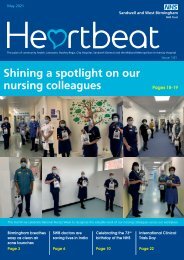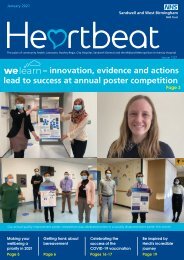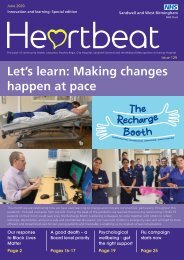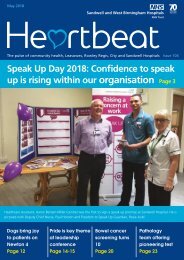Heartbeat September 2018
You also want an ePaper? Increase the reach of your titles
YUMPU automatically turns print PDFs into web optimized ePapers that Google loves.
Over 2,000 people view our<br />
outstanding end of life service<br />
PRIMARY CARE, COMMUNITIES<br />
AND THERAPIES<br />
A new video has been made to<br />
showcase our connected palliative<br />
care service, which was rated as<br />
outstanding by the Care Quality<br />
Commission.<br />
The two-minute video, which was<br />
produced in-house, has reached more<br />
than 2,000 people on Facebook and<br />
helped the team to promote its services<br />
to the wider community.<br />
<strong>Heartbeat</strong> caught up with Anna Lock,<br />
Palliative Medicine Consultant, to find<br />
out more about the new video. Anna<br />
said: “Our team thought that producing<br />
a video would help us to introduce our<br />
services to more people.<br />
“It was great to work with the<br />
communications team to carry out this<br />
Patient, Margaret Mandis features in the<br />
two minute video and describes how our<br />
connected palliative care service helped her<br />
project. We were involved throughout<br />
whole the production process; from drafting<br />
scripts and getting our colleagues to star in<br />
the video, to helping to edit the clips and<br />
pull the final video together.”<br />
She added: “The video shows how our<br />
teams work together to provide integrated<br />
care for patients and their families. Having<br />
a mix of doctors, nurses, and patients in the<br />
video is a good way of helping people to<br />
easily understand the way we work and the<br />
different roles people play.<br />
“We also filmed a patient speaking about<br />
how using one of our services had helped<br />
ease her mind, which I thought was very<br />
powerful. We believe the feedback will give<br />
patients and their families confidence in<br />
using our services.<br />
“The video was put on a number of<br />
platforms, such as our external website,<br />
Connect, and social media pages.<br />
“Sandwell and West Birmingham Clinical<br />
Commissioning Group also plan to upload<br />
the video onto its website.<br />
“We will include the video in our online<br />
newsletters, which will be sent across to<br />
acute, community services, primary care<br />
partners and care homes.”<br />
If you would like to watch the video,<br />
please visit https://www.swbh.nhs.uk/<br />
services/connected-palliative-care/<br />
Dermatology team scoop prestigious<br />
award for their new research findings<br />
A 10-year research project which<br />
explores the link between skin<br />
cancer and organ transplantation<br />
in children has been awarded<br />
‘Best Scientific Session paper’<br />
by the British Association of<br />
Dermatologists.<br />
The study called a ‘10-year longitudinal<br />
follow-up study of a UK paediatric<br />
transplant population to assess for skin<br />
cancer’, has been published this month<br />
in the British Journal of Dermatology<br />
and has found no evidence to support<br />
the link between skin cancer and organ<br />
transplants in children, as has been seen<br />
in adults.<br />
Lead researcher, Dr Michelle Thomson,<br />
Consultant Dermatologist, said:<br />
“Research has shown that adults, who<br />
are recipients of organs, are very likely to<br />
develop skin cancer due to side effects<br />
of the medication used to help prevent<br />
the immune system from attacking<br />
(“rejecting”) the donor organ.<br />
“We know that skin cancer accounts for<br />
13 to 55 per cent of all cancers in adults<br />
who have undergone a transplant.<br />
“However, the connection between skin<br />
cancer and organ transplantation in<br />
children had not been explored before.<br />
“In that light, we started this study in<br />
2004 where we recruited 90 patients aged<br />
between five and 15, who had undergone<br />
transplants including liver, kidney, and<br />
multi-organs.<br />
“We met 45 of the patients again in 2014<br />
to study their progress. Whilst none of<br />
them showed symptoms for skin cancer,<br />
11 patients had developed more than 50<br />
benign moles over the decade.<br />
“This was a concerning sign, as having<br />
more than 50 means the patient is at high<br />
risk of developing melanoma, a type of skin<br />
cancer.”<br />
Dr Thomson added that they also found<br />
patients had very little knowledge of how<br />
to look after their skin.<br />
“Seventy-eight per cent of patients reported<br />
sunburn whilst 22 per cent of them<br />
admitted they had been using sunbeds<br />
regularly.<br />
“We believe that children, who are organ<br />
recipients, still remain at risk of developing<br />
skin cancer. Therefore, our recommendation<br />
is to have a skin cancer surveillance system<br />
in place, where organ recipients can visit<br />
skin experts to check their skin regularly,<br />
and young patients should be more<br />
educated about looking after their skin.”<br />
The study was carried out by skin experts<br />
from our organisation, University Hospitals<br />
Birmingham NHS Foundation Trust, and<br />
Birmingham Women’s and Children’s NHS<br />
Foundation Trust. Dr Michele Thomson<br />
added: “It has been a great journey and I’m<br />
so proud of my team for their hard work<br />
and contribution.<br />
“I also want to thank the British Association<br />
of Dermatologists for recognising this<br />
study.”<br />
Consultant Dermatologist, Dr Michelle<br />
Thomson presenting their research findings<br />
at the British Association of Dermatologists<br />
annual conference<br />
22


















